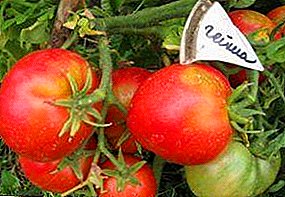 Farmers and gardeners have always been looking for ways to increase the harvest, because using organic fertilizers is very expensive and hard to find. Mineral fertilizers turned out to be cheaper, they give high yields, but after a while the owners of the plots notice that the soil is deteriorating: it becomes light, hard, sandy and does not lump together. Plants also grow weaker, start to grow worse and worse. A reasonable solution to these problems is to place compost pits on their plots. Compost well save the cost of watering and garbage collection, the purchase of a large amount of fertilizer. And all you need to send waste from the kitchen and garden in a compost container.
Farmers and gardeners have always been looking for ways to increase the harvest, because using organic fertilizers is very expensive and hard to find. Mineral fertilizers turned out to be cheaper, they give high yields, but after a while the owners of the plots notice that the soil is deteriorating: it becomes light, hard, sandy and does not lump together. Plants also grow weaker, start to grow worse and worse. A reasonable solution to these problems is to place compost pits on their plots. Compost well save the cost of watering and garbage collection, the purchase of a large amount of fertilizer. And all you need to send waste from the kitchen and garden in a compost container.
What is compost
Compost is a mixture of various biological and organic substances decomposed under the influence of the vital activity of microorganisms. Well-prepared compost will save and even improve the soil, will perfectly act as fertilizer and mulch.
Important! In garden stores, the product “compost,” which is a mixture of soil and minerals, is often found. It should not be confused with garden compost.
The use of compost in the country
Compost can be used differently on the site, it all depends on the purpose for which you need it. Compost can be mature and immature. Mature - means homogeneous and dark, has a good smell. In the immature compost will be present large, not completely decomposed particles: eggshell, pieces of branches, trunks of flowers. It also has a sharp smell. 
Did you know? It is very desirable and even necessary to introduce compost from large fibers into clay soil. Long fibers after decomposition in the soil will leave excellent root passages.To begin with, mature compost can be sifted on a garden sieve to remove hazardous items or household garbage. Sprinkle mature compost on the plot and dig. It is worth digging up carefully, since with better mixing of the compost with the earth, the loss of nitrogen will decrease, the earth will absorb more useful minerals and nutrients. Finely ground compost can also be applied on top of the soil, to maintain the lawn on the site is an excellent option. For large farms, the compost can be spread over loose soil and mixed thoroughly with a rake. Compost for giving should be made in such ratios: 10-15 square meters. 40-50 kg of compost is poured over the plot, this is 6-9 buckets with a volume of 10 liters.
Unripe compost is mainly used by gardeners and gardeners. It is needed for loosening the soil and is an excellent food for worms, fungi, microorganisms that live in the soil. It is a long-playing fertilizer, supports soil activity and nourishes plants growing throughout the season. This type of compost is introduced by digging with the soil, or it can be mixed with the soil and put this mixture in the wells for planting. Then we will figure out how to make compost at home.
How to make compost with your own hands
Harvesting compost for dacha is best in compost storage. You need to place the compost box in a convenient place for the cottager: the backyard of the kitchen garden, behind the buildings of outbuildings, in those places where it will not spoil the appearance of the plot. 
Important! Be sure to check where the water flows in the rain so that it, flowing out of the compost pit, does not fall into the wells.It is best to knock a wide box with an opening wall out of wooden planks, or simply dig a hole. Raw materials that will fall into the pit should receive a sufficient amount of oxygen, so you should not make it too deep, since the cooking process will take much longer
Quick way
To make compost to give quickly, you need to prepare the prepared compost vault conditions such as:
- Adding fresh feeds containing nitrogen. This may be a raw material that contains a large amount of moisture: kitchen waste, mowed grass, weeds, tops.
- Adding dry raw materials containing carbon. Dry branches of trees and artisanal plants, hay, straw, bark, dry leaves, ash, paper - raw materials with a high concentration of carbonaceous substances.
- Adding substances that accelerate the maturation of compost. Effective microorganisms are used as compost accelerators. These can be yeasts, fungi, lactic bacteria, and photosynthesizing. Compost ripening can also be accelerated with regular humus. It is sold in finished form in bags, but it is better and cheaper to understand how to properly make humus at home. To do this, we need to store manure of herbivore livestock in a pile or pit, cover with roofing material or wooden shields, leaving room for air to pass through. It is allowed to get into the humus of rain, but the main thing is that the water does not constantly wash the mass through. Having done everything correctly, it remains to wait until it becomes a flowing, homogeneous form. This means that the humus is ready. It usually ripens within one year.
- Maintaining a constant humidity of the compost mixture and ensuring uniform distribution of heat in the process of composting.
Did you know? As a fresh raw material, green manure crops can be specially grown: alfalfa, clover, legumes, sainfoin. They contain an increased amount of nitrogen.It is necessary to add fresh dry raw materials and humus alternating evenly. This will give the opportunity to equally distribute the air throughout the mixture, which will affect the successful maturation of fertilizer and in the future will give us the fertile right compost.
In the center of the heap the temperature during maturation of the compost reaches 60-75 ° C In order to ensure uniform distribution of heat throughout the store, you can use oilcloth, tarpaulin, old carpets and pieces of linoleum superimposed on the compost store.
But that is not all. In order to properly make the compost in the country, you need to periodically mix it, thereby evenly distributing moisture and heat throughout the heap. In dry periods of the year it can and should be watered, but also to avoid stagnation of water.
If there is a suffocating smell near the compost box, it means that there is a lot of ammonia and not enough oxygen in it, you should add dry raw materials. Compost maturation in a fast way will take time from 3 to 8 months depending on the conditions that are created for its preparation. 
Slow way
Composting can be done in a slow way. This method is very simple. For a start, we need to dig not a deep, but a sufficiently wide hole. Compost will consist of grass, branches, rotten wood. In this pit, you can add fresh manure, which to the maturation of the mixture will be humus, a good addition to the fertilizer. All of this is loaded into the pit and dripped with a small layer of soil. To prepare such a mixture will be for 2-3 years.
If at the site there are 2-3 places for compost pits and to fill them regularly every year, then within 2-3 years you can get the required amount for annual fertilization of the soil.
What components can compost be made of?
For good and fast composting, you should use:
 mowed grass and fallen leaves;
mowed grass and fallen leaves;- sleeping tea brew and coffee grounds;
- products that have not undergone heat treatment: egg shells, vegetables, fruits;
- thin branches and wood dust;
- paper, feathers, wool, fabric made from natural material;
- straw, sawdust, wood shavings, seed husks.
- fir branches and evergreens;
- animal dung and bird droppings.
Important! In European countries and the United States in the manufacture of newspapers and paints for fabrics do not use harmful additives and heavy metals. If there are doubts about the quality of paints, then such products are better not to add to the compost.
What compost can not do
However, not all products and waste can be used to make compost.
It is not recommended to add to the compost pile:
- Vegetables, egg shells and fruits after heat treatment.
- Sick plants.
- Planted, ripened, perennial weeds.
- Plants after using herbicides.
- Feces of carnivores and humans.
- Ashes and ash from burning coal and inorganic substances.
- Plants with eggs and larvae of harmful insects.
Important! To safely compost feces of carnivorous animals and people, you need a special unit - compost toilet. In such aggregates flora is maintained for the life of microorganisms and worms.

How to determine that the compost has matured
The finished compost should be dark brown, crumbly, it should not stratify into layers. The smell should not be sharp, in the most successful case the compost smells of damp forest earth.
Using these recommendations, you can easily make the compost yourself and make the soil on your site more fertile, and most importantly - environmentally friendly.


 mowed grass and fallen leaves;
mowed grass and fallen leaves;









